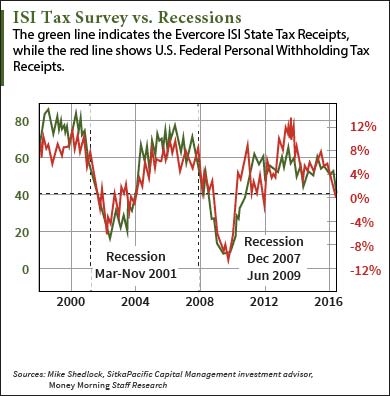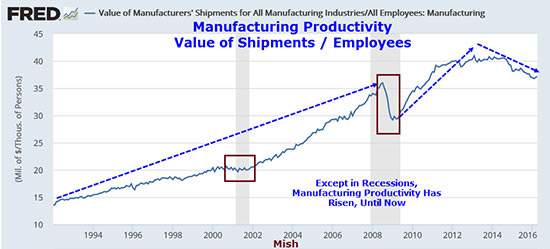The U.S. economy could be heading toward a recession, according to a little-known trend that's derived from your tax data...
You see, U.S. federal personal tax receipts and state tax receipts heavily declined in the first quarter of 2016, according to a survey from the Evercore Group. (Federal personal tax receipts are just another word for the revenue U.S. citizens paid to the federal government via payroll taxes; state tax receipts are corporate and payroll tax revenue at the state level.) The Evercore state tax receipts survey measures tax data across 16 states and accounts for 64% of the U.S. population.
The last two times these two tax receipts declined, the United States was either in or approaching a recession. That was March through November 2001, and December 2007 through June 2009 (the Great Recession).
Check out the chart below we reproduced from Mike "Mish" Shedlock, an investment advisor with SitkaPacific Capital Management. Shedlock picked up the original chart from Liz Ann Sonders, a chief investment strategist with Charles Schwab & Co. Inc.
The right Y axis shows that both state and federal tax receipts declined to about +0.1% for May 2016. If you buy into this predictive trend, that means we are currently diving headfirst into a recession...
The Trump Bankruptcies: The strength -- or weakness -- of Donald Trump's financial record going into Election 2016 lies in understanding exactly what his four bankruptcies involved. The answer might surprise you...
In addition to the recession signal, Shedlock points out another trend: The decline in tax revenue coincides with a steady decline in manufacturing productivity since 2012.
As you can see from the chart below, manufacturing productivity dips have also indicated the onset of recessions. And in the first quarter of 2016, manufacturing productivity declined by 0.6%.

Follow Money Morning on Facebook and Twitter.
How Big Money Bought the '86 Presidency: We hear a lot of agonizing about big money in politics these days, but it's really nothing new. In fact, more than a century ago the infamous robber barons - led by J.P. Morgan and John D. Rockefeller - effectively purchased a presidency. Here's how they did it...
Related Articles:
- SafeHaven: U.S. Tax Receipts Signaling Recession?


